
Italian postcard by Bromofoto, Milano, no. 1504. Photo: Paramount.

West German postcard by F.J. Rüdel, Filmpostkartenverlag, Hamburg-Bergedorf, no. 291. Photo: Consortial-Film. Anna Magnani in Assunta Spina (Mario Mattoli, 1948). In Germany, the film was titled Die Gezeichnete.
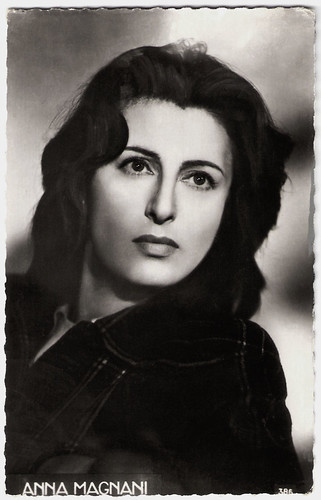
French postcard by Editions P.I., Paris, no. 386.

West-German postcard by Kolibri-Verlag. Photo: Constantin Film-Verleih GmbH. Anna Magnani in Vulcano (William Dieterle, 1950).
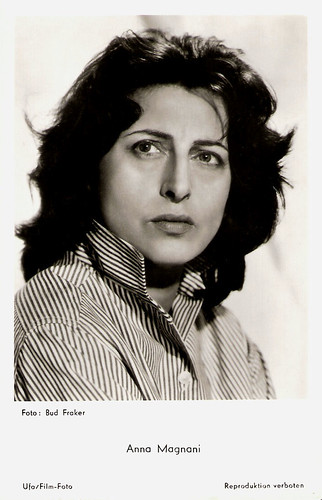
German postcard by Ufa, Berlin-Tempelhof, no. FK 4136. Photo: Bud Fraker. Anna Magnani in The Rose Tattoo (Daniel Mann, 1955).
The Italian Edith Piaf
Anna Magnani was born in Rome in 1908. She was the illegitimate child of Marina Magnani and an unknown father, whom Anna herself claimed was from the Calabria region of Italy (according to Wikipedia he was called Francesco Del Duce). She was raised by her maternal grandmother in a slum district of Rome after her mother left her.
At 14, she enrolled in a French convent school in Rome, where, she learned to speak French and play piano. She also developed a passion for acting from watching the nuns stage their Christmas play. At age 17, she went on to study at Santa Cecilia's Corso Eleanora Duse (the Eleanora Duse Royal Academy of Dramatic Art) in Rome. To support herself, Magnani sang bawdy Roman songs in nightclubs and cabarets leading to her being dubbed ‘the Italian Edith Piaf’.
She began touring the countryside with small repertory companies and had a small role in the silent film Scampolo (Augusto Genina, 1928) starring Carmen Boni. In 1933 she was acting in experimental plays in Rome when she was discovered by Italian filmmaker Goffredo Alessandrini. She played in La Cieca di Sorrento/The Blind Woman of Sorrento (Nunzio Malasomma, 1934). They married in 1933, shortly before the film was released. Magnani retired from full-time acting to devote herself exclusively to her husband, although she continued to play smaller film parts.
Under Alessandrini, she next appeared in Cavalleria/Cavalry (Goffredo Alessandrini, 1936) with Amedeo Nazzari, followed by La Principessa Tarakanova/Betrayal (Fyodor Otsep, Mario Soldati, 1938) featuring Annie Vernay. Alessandrini and Magnani separated in 1942 and finally divorced in 1950. After their separation her son Luca was born, the result of a brief affair with Italian matinée idol Massimo Serato. Magnani's life was struck by tragedy when Luca came down with crippling polio at only 18 months of age. He never regained the use of his legs. As a result, she spent most of her early earnings on specialists and hospitals.
In 1941, Magnani played the second female lead in the comedy of errors Teresa Venerdì/Do You Like Women (Vittorio De Sica, 1941) which writer-director Vittorio De Sica called Magnani’s ‘first true film’. In it, she plays Loletta Prima, the girlfriend of Di Sica’s character, Pietro Vignali. But her international breakthrough role had still to come.
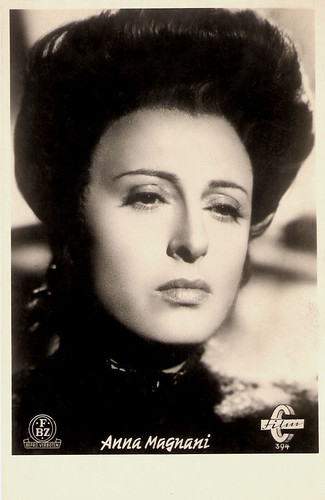
German postcard by FBZ, no. 394. Photo: Cfilm. Anna Magnani in Assunta Spina (Mario Mattoli, 1948).

Italian postcard by Bromofoto, Milano, no. 104. Photo: Lux Film, Rome.

Vintage postcard in the Moviestar series. Photo: Video (Lux Film).

Vintage postcard by Liceo Artistico statale di Venezia / Panaria Film. Photo by Fosco Maraini. Anna Magnani and director William Dieterle in between the takes of the Italian film Vulcano (William Dieterle, 1950), shot in 1949. The man on the right could be producer Renzo Avanzo. The card was released by Panaria Film on the occasion of the preservation of the film in 2007.

Italian postcard by Liceo Artistico statale di Venezia, 2007. Photo: Fosco Maraini. Anna Magnani in Vulcano (William Dieterle, 1950). Caption: Anna Magnani, with the island of Vulcano in the background.
One of cinema's most devastating moments
Anna Magnani’s film career had spread over 18 years before she gained international renown as Pina in the neorealist milestone Roma, città aperta/Rome, Open City (Roberto Rossellini, 1945) about the final days of the Nazi occupation of Rome.
Magnani gave a brilliant performance as a woman who dies fighting to protect her husband, an underground fighter against the Nazis. Her harrowing death scene remains one of cinema's most devastating moments.
It established her as a star, although she lacked the conventional beauty and glamour often associated with the term. Slightly plump and rather short in stature with a face framed by unkempt raven hair and eyes encircled by deep, dark shadows, she smouldered with seething earthiness and volcanic temperament.
Roberto Rossellini was her lover at the time, and she collaborated with him on other films, including L'Amore/Love (Roberto Rossellini, 1948) a two-part film including Il miracolo/The Miracle and Una voce umana/The Human Voice. In the former, she played a pregnant outcast peasant who was seduced by a stranger and comes to believe the child she subsequently carries is Christ. Magnani plumbs both the sorrow and the righteousness of being alone in the world. The latter film is based on Jean Cocteau's play about a woman desperately trying to salvage a relationship over the telephone. It is remarkable for the ways in which Magnani's powerful moments of silence segue into cries of despair.
Rossellini promised to direct her again in Stromboli, the next film he was preparing. However, when the screenplay was completed, he gave the role to Ingrid Bergman. This and his affair with the Swedish Hollywood star caused Magnani's breakup with Rossellini. As a result, she took on the starring role of Volcano/Vulcano (William Dieterle, 1949) with Rossano Brazzi, which was deliberately produced to invite comparison.

Italian postcard Marsilio Edizioni di Bianco & Nero. Photo: Paul Ronald. Anna Magnani in Bellissima (Luchino Visconti, 1951).

Reproduction of press photo. Photo: Paul Ronald. Anna Magnani in Bellissima (Luchino Visconti, 1951).
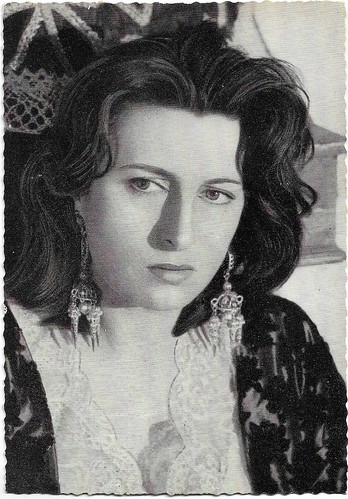
German film card by Filmbilder-Filmvertrieb Ernst Freihoff, Essen, no. 100. Photo: Dial / Unitalia Film. Anna Magnani as Camilla in the comedy La carrozza d'oro/ La carrosse d'or/The Golden Coach (Jean Renoir, 1952).
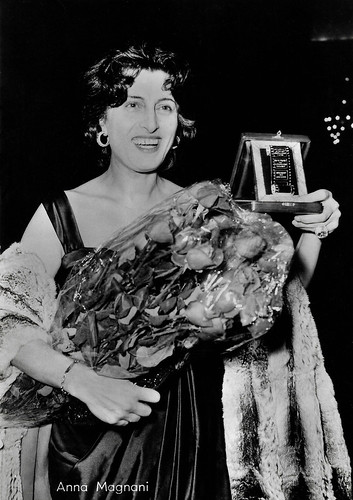
Italian postcard, no. 195. In 1957, Anna Magnani received the Nastri d'Argento (Silver Ribbon) award for Best Actress in a Leading Role for the film Suor Letizia/When Angels Don't Fly (Mario Camerini, 1956).

Italian postcard by Bromostampa, Milano, no. 110.
Prostitutes and suffering mothers
In 1950, Life magazine stated that Anna Magnani was "one of the most impressive actresses since Garbo." In Bellissima (Luchino Visconti, 1951) she played Maddalena, a blustery, obstinate stage mother who drags her daughter to Cinecittà for the 'Prettiest Girl in Rome' contest, with dreams that her plain daughter will be a star. Her emotions in the film went from those of rage and humiliation to maternal love. She later starred as Camille, a commedia dell'arte actress torn between three men, a soldier, a bullfighter, and a viceroy, in Le Carrosse d'or/The Golden Coach (Jean Renoir, 1953).
In Hollywood, she starred opposite Burt Lancaster as Serafina, the widowed mother of a teenage daughter in The Rose Tattoo (Daniel Mann, 1955). Screenwriter and close friend Tennessee Williams based the character of Serafina on Magnani. He even stipulated that the film must star Magnani. It was Magnani's first English-speaking role in a mainstream Hollywood movie, winning her the Academy Award, the BAFTA, the Golden Globe and the New York Film Critics Circle Award for Best Actress. Magnani worked with Tennessee Williams again on The Fugitive Kind (Sidney Lumet, 1959), co-starring with Marlon Brando. In Hollywood she also appeared in Wild is the Wind (George Cukor, 1957), for which she was again nominated for the Academy Award.
In Italy, she played strong-willed prostitutes and suffering mothers in such films as the women-in-prison drama Nella città l'inferno/The Wild, Wild Women (Renato Castellani, 1958) with Giulietta Masina, and Mamma Roma (Pier Paolo Pasolini, 1962). In Mama Roma Magnani is both the mother and the whore, playing an irrepressible prostitute determined to give her teenage son a respectable middle-class life. It was controversial but also one of Magnani's most critically acclaimed films.
In this later period of her career, she also appeared on Italian television and acted on the stage, most notably in 1965 when she starred in 'La Lupa' (She-Wolf), directed by Franco Zeffirelli, and in 1966 when she played the lead in Jean Anouilh's 'Medea', directed by Gian Carlo Menotti. In the film comedy The Secret of Santa Vittoria (Stanley Kramer, 1969), she co-starred with Anthony Quinn as a fighting husband and wife. Magnani and Quinn did also feud in private and their animosity spilled over into their scenes. Reportedly she bit Quinn in the neck and kicked him so hard that she broke a bone in her right foot. Her final screen performance was a cameo in Fellini's Roma (Federico Fellini, 1972).
In 1973, Anna Magnani died at the age of 65 in Rome, after a long battle with pancreatic cancer. Her son Luca and her favourite director Roberto Rossellini were at her bedside. With Rossellini, she'd patched up her disagreements some years before. It was reported that an enormous crowd turned out for her funeral in Italy, in a final public salute that is more typically reserved for Popes.

Italian postcard La Rotografica Romana. Photo: Anna Magnani in Nella città l'inferno/Caged (Renato Castellani, 1959).

Vintage postcard by News Productions, Switzerland/Germany/UK. Photos: Sam Shaw. Anna Magnani and Marlon Brando in The Fugitive Kind (Sidney Lumet, 1960).

Czech collectors card by Pressfoto, Praha (Prague), no. S 37/2, 1964. Anna Magnani in Risate de Gioia/The Passionate Thief (Mario Monicelli, 1960).

East-German postcard by VEB Progress Film-Vertrieb, Berlin, no. 2823, 1967. Sent by mail in East Germany in 1974. Anna Magnani in Mamma Roma (Pier Paolo Pasolini, 1962).
Scene from The Rose Tattoo (1953). Source: The SuppActress (YouTube).
Anna Magnani sings Scapricciatiello in Wild is the Wind (1957). Source: Minuit (YouTube).
Sources: Il Cinema Ritrovato 2023, Jason Ankeny (All Movie), Norman Powers (IMDb), Answers.com, Wikipedia and IMDb.
Mamma Roma!!! ♥
ReplyDeleteMerry Christmas! I really enjoyed reading about this unconventional woman. What an interesting person she must have been. I would have loved to have sat down with her for a long chat.
ReplyDeleteThank you for sharing, and Happy PFF!